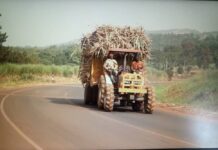The COVID-19 pandemic has led to the highest rates of environmental degradation in some parts of the country, as people sought for alternative economic activities to survive the lockdown induced by the pandemic.
These include people who lost their usual incomes as businesses closed down, while others could not manage to travel to their workplaces due to restrictions on transport.
Reports have shown that people who were in formal employment, like teachers, resorted to dealing in charcoal, firewood and farming, as uncertainty continues on whether and when schools would reopen.
Now, a research by the Heifer International, a not-for-profit organisation that supports smallholder farmers shows that 69 percent of farmers in the area where the organisation operates, resorted to tree-cutting for various reasons.
These included burning charcoal, making firewood which they say was the quickest means of getting an income, as well as diversifying into other farming activities into quicker-maturing crops.
Another 14 percent say they encroached onto swamps.
The survey conducted in three regions; Northern, Eastern and Central featured 448 smallhold farmers, while more data was extracted from 10 agribusiness hubs, four private sector business partners and the district local governments.
The survey was aimed at determining the conditions the farmers were going through after the lockdown made it difficult for Heifer International and other support organisations and extension officials, to interact with farmers.
Almost all farmers, or 97 percent, reported that COVID-19 has affected their income, with 86 percent saying their incomes dropped by half, while 10 out of every 100 people lost all their income and only two reported an increase.
Heifer International Country Director for Uganda, William Matovu says for example, that dairy farmers who have no milk cooling plants lost all their milk businesses.
The farmers say, apart from failure to take their products to markets, their production processes were affected as the required farm inputs were either delayed for delivery, or could not be got at all due to transport restrictions.
More than 70 percent of farmers surveyed also reported that the price of farming inputs like seeds, feeds and vaccines increased by almost half, making production too costly for them.
For instance, a kilo of poultry feed increased by half from 1,000 shillings to 1,500 shillings, further cutting the incomes of the farmers.
The reduction in income negatively affected household access to food, with most families consuming one meal per day instead of three meals consumed before COVID-19.
In addition, a fall in household income had a direct effect on businesses where families used up their savings and consumed the working capital from the businesses, hence the need for capital to restart the same businesses or invest in new lines of business.
Twenty-five percent of the households took up microloans from friends and relatives as a coping mechanism for survival.
More than half of the farmers (56%) eat two meals per day, with a third only affording one meal per day, while all households that ate one meal before the outbreak of Covid 19, still eat one meal, according to the findings.
This is one of the reasons for the increase in domestic instabilities in most families.
The report revealed that 42 percent of respondents experienced domestic violence or conflict and that 46% of women have lost access to land, utensils or other items like bicycles since COVID-19.
To cope with the reduction in household income, about two thirds of farmers are surviving on savings and borrowing or receiving cash from friends and relatives, but another 6 percent are surviving on business capital.
These may not be able to return to business even after the pandemic, but Matovu says this should be an encouragement for smallholder farmers to save during good times for situations like a pandemic.
The research advises that among other efforts to boost economic recovery of the sector and the economy as a whole, smallholder producers should be strengthened through groups or cooperatives. This also enables them to initiate survival measures themselves, according to Matovu.


